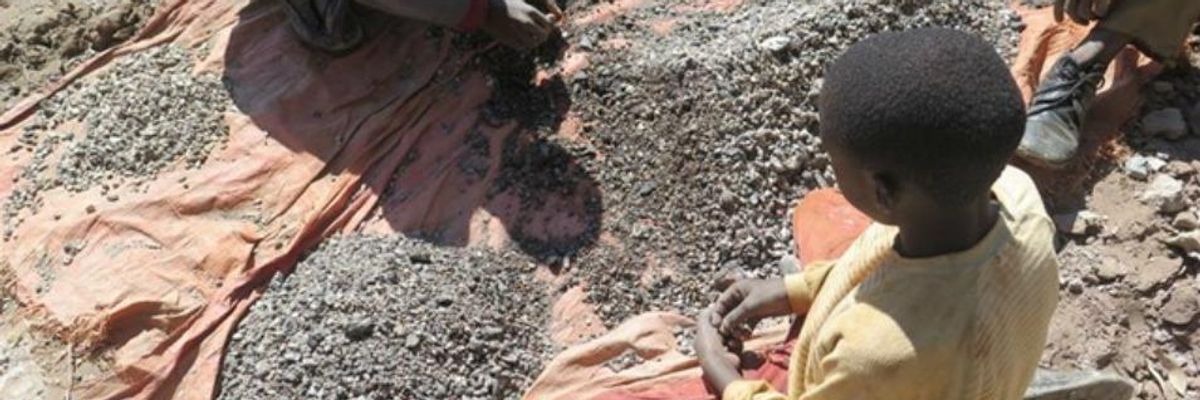A damning new report issued Tuesday accuses Apple, Samsung, Sony, and Volkswagen, among other major multinational corporations, of failing to do basic checks to ensure that cobalt mined by child laborers has not been used in their products.
The investigation by Amnesty International and Afrewatch (Africa Resources Watch), an NGO based in the Democratic Republic of Congo (DRC), traces the sale of cobalt, used in lithium-ion batteries for cell phones and electric cars, from mines where children as young as seven and adults work in "perilous conditions."
"The glamourous shop displays and marketing of state of the art technologies are a stark contrast to the children carrying bags of rocks, and miners in narrow manmade tunnels risking permanent lung damage."
--Mark Dummett, Amnesty International
In the DRC--by far the single most important source of cobalt in the world, the report states--"the vast majority of miners spend long hours every day working with cobalt without the most basic of protective equipment, such as gloves, work clothes or facemasks to protect them from lung or skin disease," according to Amnesty.
Children told the organization that they work for up to 12 hours a day in the mines, "carrying heavy loads to earn between one and two dollars a day." At least 80 miners died underground in southern DRC between September 2014 and December 2015 alone. "The true figure is unknown as many accidents go unrecorded and bodies are left buried in the rubble," Amnesty notes.
But from cobalt traders on up the supply chain, there appears to be little to no concern--or awareness--about such human rights abuses. Unlike gold, tin, tungsten, and other raw materials, cobalt does not fall under existing "conflict minerals" rules in the U.S.
"The glamorous shop displays and marketing of state of the art technologies are a stark contrast to the children carrying bags of rocks, and miners in narrow manmade tunnels risking permanent lung damage," said Mark Dummett, business and human rights researcher at Amnesty International.
By interviewing traders and following vehicles of miners and traders as they carried cobalt ore from mines to markets where larger companies buy the ore, Amnesty was able to document how the mineral ends up in the hands of Congo Dongfang Mining (CDM), a wholly-owned subsidiary of Chinese mineral giant Zhejiang Huayou Cobalt Ltd (Huayou Cobalt).
The organization then used investor documents to show how Huayou Cobalt and its subsidiary CDM process the cobalt before selling it to three battery component manufacturers in China and South Korea. In turn, they sell to battery makers who claim to supply technology and car companies, including Apple, Microsoft, Samsung, Sony, Daimler, and Volkswagen.
Amnesty then contacted those and 10 other multinational consumer brands listed as direct or indirect customers of the three battery component manufacturers. Just one company admitted the connection, while the others issued various forms of denial.
"The abuses in mines remain out of sight and out of mind because in today's global marketplace consumers have no idea about the conditions at the mine, factory, and assembly line."
--Emmanuel Umpula, Afrewatch
"Crucially, none provided enough details to independently verify where the cobalt in their products came from," Amensty declares.
"It is a major paradox of the digital era that some of the world's richest, most innovative companies are able to market incredibly sophisticated devices without being required to show where they source raw materials for their components," said Emmanuel Umpula, Afrewatch executive director. "The abuses in mines remain out of sight and out of mind because in today's global marketplace consumers have no idea about the conditions at the mine, factory, and assembly line. We found that traders are buying cobalt without asking questions about how and where it was mined."
Added Amnesty's Dummett: "Many of these multinationals say they have a zero tolerance policy for child labor. But this promise is not worth the paper it is written when the companies are not investigating their suppliers."
"Without laws that require companies to check and publicly disclose information about where they source minerals and their suppliers, companies can continue to benefit from human rights abuses," he continued. "Governments must put an end to this lack of transparency, which allows companies to profit from misery."

